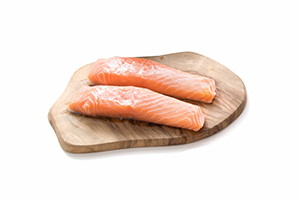 Let’s say you’ve had bariatric surgery and meat just isn’t sitting right in your new stomach pouch, which is a common situation for some people after gastric sleeve, gastric bypass, or lap band surgery. Someone suggests for you to try seafood, but you never really tried it before. But, you’re willing to try anything that you can tolerate, so you go to buy salmon. When you go to the store, you’re faced with a choice: wild or farm raised?
Let’s say you’ve had bariatric surgery and meat just isn’t sitting right in your new stomach pouch, which is a common situation for some people after gastric sleeve, gastric bypass, or lap band surgery. Someone suggests for you to try seafood, but you never really tried it before. But, you’re willing to try anything that you can tolerate, so you go to buy salmon. When you go to the store, you’re faced with a choice: wild or farm raised?
If you’ve never really bought salmon before, facing such a choice at the grocery store might be enough to make you give up and walk away. Which one is better? Is one bad for me? Is one bad for the environment? Are they the same nutritionally? We want to help you make the best decision.
When debating whether farm-raised or wild salmon is the right choice, there are some factors to consider. First, farm-raised salmon and wild salmon differ in their living conditions. Wild salmon are just that- wild. They swim and eat freely. Farm raised salmon are kept in tanks and fed by humans, often in conditions which are not ideal for the salmon. Second, they do have some nutritional differences. Wild salmon can have fewer calories and saturated fat. Both fish can have varying levels of omega 3 fatty acids depending on their diet. Also, both fish can have some compounds that aren’t the best (such as pollutants) depending on their environment and diet. Third, fish farms pose an environmental risk as the fish excrement and uneaten food collect in the waterway.
So, which is better? According to the Environmental Working Group (EWG), there is evidence that the industry-wide conditions of most (but not all) of farm-raised salmon lead to high levels of PCBs (polychlorinated biphenyls). The answer as to which salmon is better is really hard to determine based on so many differences between types, brands, and harvest locations of the salmon.
So where does that leave bariatric weight loss patients looking for sources of quality protein? One suggestion is to buy a small amount of salmon for you to try, especially if you don’t know if your new stomach can handle this new protein. If this is the case, buy what you want- fresh, frozen, canned, wild, or farm raised- and give it a try. If your new stomach can tolerate the salmon and you prepare it moist enough to prevent gagging, you may want to consider incorporating more salmon into your new bariatric weight loss diet. If that’s where you are, consider researching the specific types and brands of salmon available to you in a price range you can afford. Once you’ve gotten the specifics about your options, you will be better prepared to make a more informed decision on your choice of salmon.
Seafood can make a great source of protein for weight loss surgery patients, even fatty seafood like salmon. While the choices out there can be daunting, do your research and make an informed choice for you.
The above is offered by Dr. Shillingford, MD, PA, a board-certified surgeon specializing in advanced laparoscopic and weight loss surgery. Dr. Shillingford’s gastric sleeve, gastric bypass, and gastric band patients come from all over Florida, including Boca Raton, Miami, Fort Lauderdale, Tampa, Orlando, Naples, and Jacksonville. Dr. Shillingford encourages his patients to follow his post-op diet, where fish and seafood can easily be incorporated to maximize protein content. For more information on gastric sleeve, gastric bypass, or lap band surgeries, call Dr. Shillingford’s office at (561) 483-8840.










